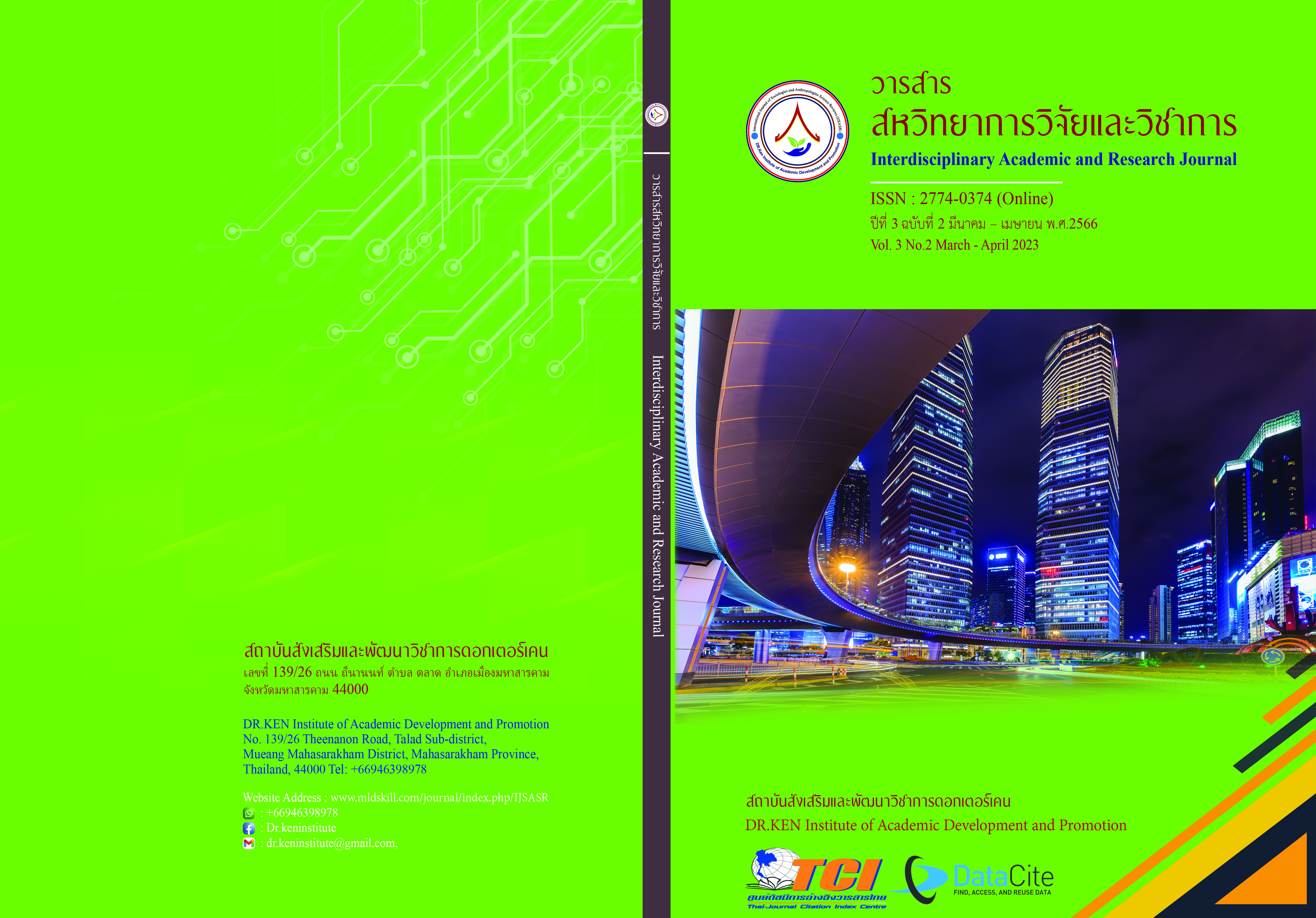Educational Technology Leadership of School Administrators under the Office of Buriram Primary Education Service Area 2
DOI:
https://doi.org/10.14456/iarj.2023.79Keywords:
Technology Leadership; , School AdministratorsAbstract
Technological leadership is becoming more necessary and important in today's times as the use of technology expands and becomes closer to the work of personnel in both teaching and support departments. The executive leadership is thus affected by the change and the leader must understand the change. The modern leaders must understand and see the importance of current and future technologies. The purposes of this research were (1) to study the educational technology leadership of school administrators under the Office of Buriram Primary Educational Service Area Office 2. And (2) to compare the level of opinions of personnel on educational technology leadership of school administrators under the Office of Buriram Primary Educational Service Area 2 classified by sex, work experience, and academic position. The population in this research consisted of 3,111 personnel under the Buriram Primary Educational Service Area Office 2 with a sample size of 342 people. The research tool was a questionnaire on educational technology leadership level of school administrators. The statistics used in the research were frequency, mean, percentage, standard deviation, F-test, and t-test. The results showed that (1) The opinion level of education technology leadership of educational institute administrators under the Office of Buriram Primary Educational Service Area Office 2 overall was at a high level. And (2) the comparative analysis of opinions towards educational technology leadership of school administrators under the Office of Buriram Primary Educational Service Area Office 2 found that (a) Classified by sex, the overall difference was statistically significant at the .05 level, not different for each aspect. (b) Classified by overall and individual work experience is not different. And (c) Classified according to the overall academic position and not different in each area.
References
นงลักษณ์ ศิริฟัก. (2562). ภาวะผู้นำการเปลี่ยนแปลงของผู้บริหารกับการใช้เทคโนโลยีสารสนเทศและการสื่อสาร ในสถานศึกษาระดับมัธยมศึกษา จังหวัดกาญจนบุรี. วารสารการบริหารการศึกษา มหาวิทยาลัยศิลปากร. 10(2), 213-224.
บุญชม ศรีสะอาด. (2553). วิธีการทางสถิติสาหรับการวิจัย. กรุงทพฯ: สุวีริยาสาส์น.
มานพ ศรีโกตะเพชร (2559). ภาวะผู้นำทางวิชาการของผู้บริหารสถานศึกษาโรงเรียนขนาดเล็กสังกัดสำนักงานเขตพื้นที่การศึกษาประถมศึกษาบุรีรัมย์ เขต 1. วิทยานิพนธ์หลักสูตรครุศาสตรมหาบัณฑิต (การบริหารการศึกษา) มหาวิทยาลัยราชภัฏบุรีรัมย์
วสันต์ชัย สดคมขำ. (2563). ภาวะผู้นำเชิงเทคโนโลยีของผู้บริหารสถานศึกษาที่ส่งผลต่อการบูรณาการเทคโนโลยีและเจตคติต่อการใช้เทคโนโลยีของครูในสถานศึกษา สังกัดสำนักงานเขตพื้นที่การศึกษาประถมศึกษาสุพรรณบุรี เขต 1. การศึกษามหาบัณฑิต สาขาวิชาการบริหารการศึกษา คณะศึกษาศาสตร์ มหาวิทยาลัยศรีนครินทรวิโรฒ.
ศิรภัสสร สีใหม่ และ ทวี วาจาสัตย์. (2564). ภาวะผู้นำทางเทคโนโลยีการศึกษาของผู้บริหารโรงเรียนสังกัดองค์การบริหารส่วนจังหวัดสระแก้ว. วารสารวิชาการมหาวิทยาลัยปทุมธานี. 13(2), 167-179.
สำนักงานคณะกรรมการศึกษาขั้นพื้นฐาน. (2565). ระบบสารสนเทศเพื่อการบริหารงาน. กรุงเทพฯ :สำนักงานคณะกรรมการศึกษาขั้นพื้นฐาน.
สุชญา โกมลวานิช. (2564). ภาวะผู้นำดิจิทัลของผู้บริหารสถานศึกษาที่ส่งผลต่อสมรรถนะครูในศตวรรษที่ 21 สังกัดสำนักงานเขตพื้นที่การศึกษามัธยมศึกษาเขต 23. วารสารวิจัย มข. สาขามนุษยศาสตร์และสังคมศาสตร์ (ฉบับบัณฑิตศึกษา). 9(2), 32-41.
ออระญา ปะภาวะเต. (2564). แนวทางการพัฒนาภาวะผู้นำยุคดิจิทัลของผู้บริหารสถานศึกษา สังกัดสำนักงานเขตพื้นที่การศึกษาประถมศึกษาบุรีรัมย์ เขต 2. Journal of Modern Learning Development. 6(4), 142- 158.
อำนวย มีราคา. (2564). ภาวะผู้นำของผู้บริหารสถานศึกษาโรงเรียนพระปริยัติธรรมแผนกสามัญศึกษา ในยุคดิจิทัล. วารสาร มจร อุบลปริทรรศน์. 6 (3), 245-262.
Blake, R. & McCanse, A. (1991). Leadership dilemmas-grid solutions. Houston, TX: Gulf Publishing Company.
Yamane, T., (1973). Statistics: An Introductory Analysis. 3rd Edition. New York: Harper and Row Publications.
Downloads
Published
How to Cite
Issue
Section
License
Copyright (c) 2023 เจนจิรา จุ้ยประโคน

This work is licensed under a Creative Commons Attribution-NonCommercial-NoDerivatives 4.0 International License.
Copyright on any article in the Interdisciplinary Academic and Research Journal is retained by the author(s) under the under the Creative Commons Attribution-NonCommercial-NoDerivatives 4.0 International License. Permission to use text, content, images, etc. of publication. Any user to read, download, copy, distribute, print, search, or link to the full texts of articles, crawl them for indexing, pass them as data to software, or use them for any other lawful purpose. But do not use it for commercial use or with the intent to benefit any business.
















.png)


